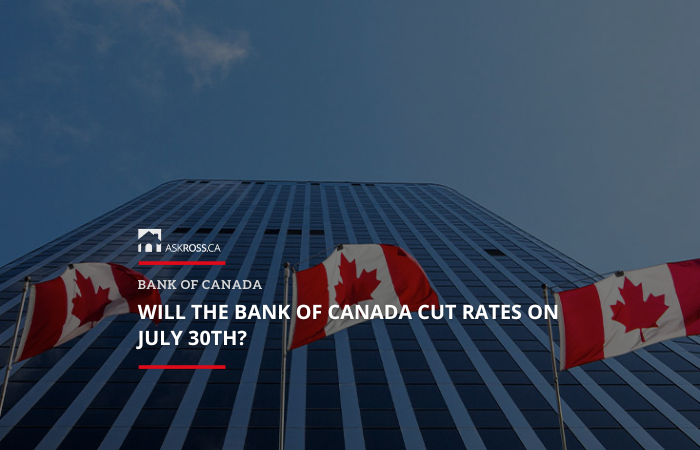
Published: July 10th, 2025 • Last Updated: July 16th, 2025
Author: Ross Taylor on AskRoss.ca
What July’s BoC Decision Means for Variable, Fixed, and Renewal Mortgage Rates in 2025
Every time we get close to another Bank of Canada interest rate announcement, I start getting the same questions:
“Are rates going to drop again?” – “Should I wait to buy?” – “What’s going to happen to my renewal?”
And with good reason, these announcements affect your mortgage, your monthly budget, and the real estate market as a whole.
So let’s get into it: when the next rate decision is coming, what the Bank did last time, and what the experts are predicting for the rest of 2025.
Jump to a specific section in this article ↓↓
- UPDATE: What do the latest inflation numbers mean for the July 30th rate decision?
- Upcoming Bank of Canada Announcement Dates
- When is the next Bank of Canada rate announcement?
- Why does this BoC meeting matter more than most?
- What happened at the last rate announcement?
- The U.S. vs Canada trade war has entered the chat
- Are interest rates expected to go up or down this year?
- How will rate decisions affect your mortgage?
- How will the BoC rate affect the housing market?
- Advice from Ross Taylor Mortgages
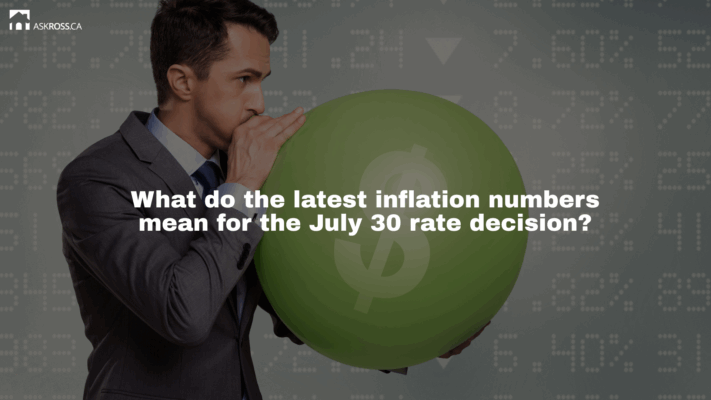
What do the latest inflation numbers mean for the July 30th rate decision?
We just got the latest inflation numbers, and while the headline figure looks promising, the underlying data suggests the Bank of Canada will likely hold rates steady on July 30th.
Here’s the good news
- Headline inflation came in at 1.9%, below the Bank of Canada’s 2.0% target.
- Markets had predicted exactly this result, so there were no surprises.
- This marks one of the first times in a while that inflation has landed below target, which shows progress on the BoC’s part.
The bad news
- Core inflation rose to 2.7%, up from 2.5% in the previous reading.
- The CPI trimmed-mean held steady at 3.0%, which is better than going higher, but still uncomfortably above the 2.0% target.
- These underlying measures of inflation are what the Bank of Canada watches most closely, and right now, they’re still running too hot.
What is theTrimmed-Mean CPI?
The trimmed-mean Consumer Price Index (CPI) is one of the Bank of Canada’s key core inflation measures. It’s designed to give a clearer picture of underlying inflation trends by removing the most extreme price movements—both high and low—from the overall CPI basket.
In simple terms:
The trimmed-mean CPI “trims” away outlier price changes, like big spikes or drops in certain goods or services, so that volatile one-off events (think gasoline prices, airfares, or produce affected by weather) don’t distort the inflation trend.
My take
While headline inflation is on track, the underlying pressures haven’t cooled enough to guarantee further rate cuts just yet.
This report gives the Bank of Canada a solid reason to hold rates steady on July 30th, especially if the U.S. Federal Reserve also pauses later this month.
Personally, I was hoping the core inflation reading would stay flat or decline, which would’ve strengthened the case for another cut from the Bank of Canada.
↑↑ Back to the list at the top ↑↑
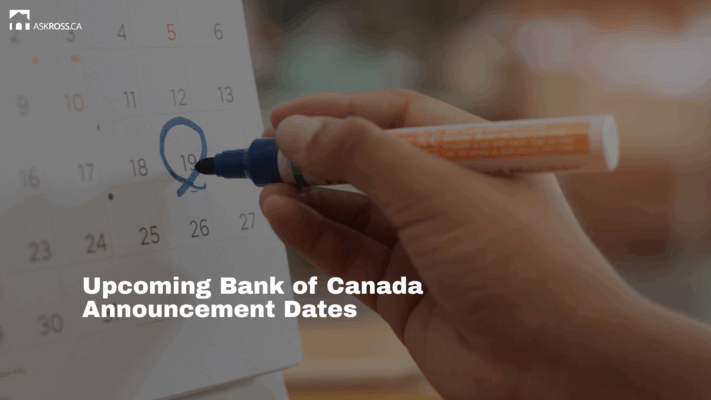
Upcoming Bank of Canada Announcement Dates
Click the links to save the next BoC Rate Announcement dates in your Google Calendar:
- Wednesday, July 30th, 2025
- Wednesday, September 17th, 2025
- Wednesday, October 29th, 2025
- Wednesday, December 10th, 2025
To add these events to your Google Calendar, simply click on the dates above.
↑↑ Back to the list at the top ↑↑
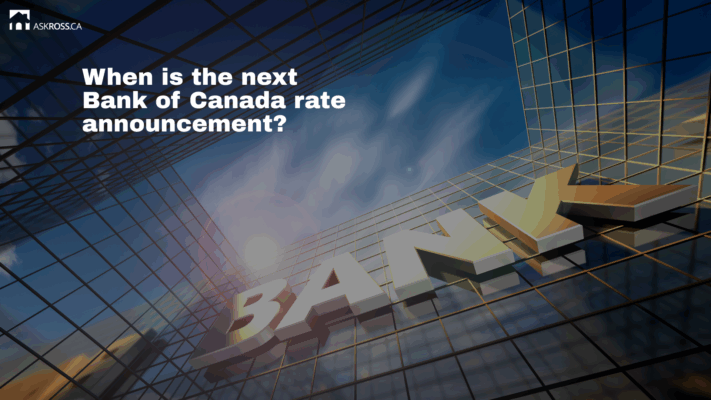
When is the next Bank of Canada rate announcement?
The next scheduled Bank of Canada interest rate decision is Wednesday, July 30, 2025.
And it’s an important one, not just because of the interest rate itself, but because this meeting also comes with a fresh Monetary Policy Report, which gives us insight into the BoC’s current economic outlook.
This will be the fifth of eight scheduled announcements in 2025.
Each one has the power to influence mortgage rates, impact the housing market, and affect decisions for homebuyers, sellers, and anyone with a mortgage renewal approaching.
↑↑ Back to the list at the top ↑↑

Why does this BoC meeting matter more than most?
We’re more than halfway through the year, and Canadians are hoping for a break. After a sharp rate-cutting cycle that started in 2024, the pace has slowed.
The July 30th decision will tell us whether the Bank thinks inflation is under control or if they’re still feeling cautious.
↑↑ Back to the list at the top ↑↑

What happened at the last rate announcement?
At the June 4, 2025, meeting, the Bank of Canada held the overnight rate steady at 2.75%, following several rate cuts over the previous year that lowered the rate by more than two full percentage points.
The decision to hold was driven by mixed economic signals
So why didn’t they cut again in June? The data was sending mixed signals, and the Bank didn’t want to get ahead of itself.
Inflation is heading in the right direction, but shelter costs are still too high
- Yes, the overall inflation number is moving closer to the Bank’s 2% target, which is good news.
- However, the cost of housing, whether you’re renting or have a mortgage, remains high. That’s putting pressure on household budgets, and the Bank can’t ignore the role housing plays in core inflation.
The job market is cooling
- Employment growth has slowed down. This suggests the earlier rate hikes are doing their job by tempering demand, but it also signals a potential slowdown in consumer spending and confidence.
- The Bank doesn’t want to tip it over into a downturn by pulling back support too quickly.
Consumers are pulling back, and global uncertainty isn’t helping
- Canadians are spending less, which again points to the impact of higher borrowing costs.
- Add in concerns about the global economy—slower growth in Europe and China, for example—and you’ve got a good reason to take a cautious approach.
↑↑ Back to the list at the top ↑↑
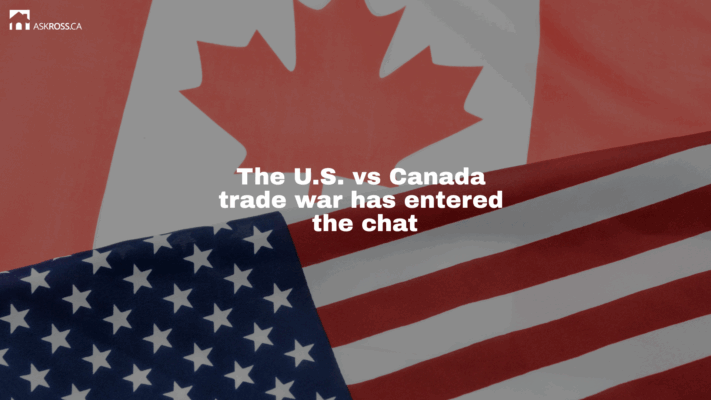
The U.S. vs Canada trade war has entered the chat
The elephant in the room this time around is the escalating trade tensions between the U.S. and Canada.
Tariffs and retaliatory measures are creating a whole new layer of uncertainty that is directly influencing the Bank of Canada’s playbook.
Uncertainty equals inaction
- The BoC has clearly stated it is “in a holding pattern” until more clarity emerges on U.S. trade policy. This is a major reason why we didn’t see a rate cut in June.
- They’re watching how tariffs affect exports, business investment, and inflation before making another move.
Caught between inflation and recession risks
- On one hand, tariffs drive up costs on imported goods, fueling inflation.
- On the other hand, they can cool economic growth by hurting Canadian exporters and investors.
- It is a lose-lose scenario, and the Bank is walking a tightrope trying to balance those two forces.
They’re ditching forecasts and going full scenario mode
- The BoC has stopped issuing its usual forecasts in favour of scenario planning. One scenario involves a severe recession if the trade war escalates further.
- The message is clear: the Bank is ready to move aggressively if things go off the rails.
↑↑ Back to the list at the top ↑↑
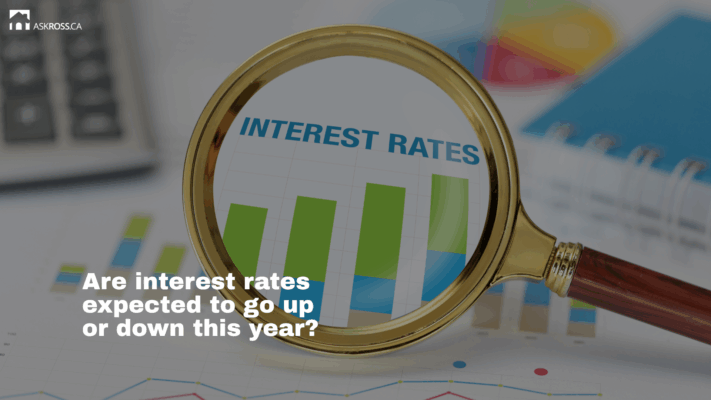
Are interest rates expected to go up or down this year?
Let me give you the short version: down, but slowly.
Most economists and market watchers expect at least one more rate cut by the end of 2025, possibly at the July 30th meeting.
But the cuts are expected to be small, likely 0.25% at a time, and highly dependent on the next few inflation readings.
What are the experts forecasting?
- TD Economics and others forecast the overnight rate could reach 2.50% by year-end if inflation continues to behave.
- Bond markets are already pricing in a modest rate cut by July or September.
- Mortgage rate predictions suggest that prime rates could settle around 4.70–4.90% later in the year (down from the current 4.95%).
In other words, the era of rapid rate hikes is behind us, but we’re not racing toward rock-bottom rates either.
↑↑ Back to the list at the top ↑↑

How will rate decisions affect your mortgage?
For variable-rate mortgage holders
If the BoC cuts the rate by 0.25% on July 30th, and your lender follows suit, your monthly payment could drop by roughly $70 per $500,000 of mortgage (assuming a 25-year amortization).
That’s meaningful, but still a far cry from the ultra-low payments we saw during the early pandemic years.
That said, for households squeezed by rising living costs, every bit of relief counts.
For fixed-rate mortgage shoppers
Fixed rates are influenced more by bond yields, and those have already baked in some expectation of further rate cuts.
So, unless there’s a big surprise from the Bank, don’t expect a dramatic drop in fixed rates immediately after July 30th.
However, if inflation continues to trend down and the BoC signals more cuts to come, we could see five-year fixed mortgage rates dip further into the low 5% range.
Is your mortgage renewal approaching?
If your renewal is coming up, you’re still in a tough spot compared to five years ago. But the pain is starting to ease.
Locking in now at a three-year fixed could be a smart hedge, giving you a decent rate today and the flexibility to reprice sooner if rates fall more dramatically in 2026 or 2027.
↑↑ Back to the list at the top ↑↑

How will the BoC rate affect the housing market?
Lower interest rates often mean increased demand in real estate, especially among first-time buyers and investors who were previously priced out.
But affordability is still under pressure.
Even as borrowing costs come down slightly, home prices in many regions are climbing again, especially in urban centres. And with immigration levels high and housing supply still tight, that trend may not reverse quickly.
So while lower rates may help with monthly payments, they might also be fueling more competition for homes.
Regional and demographic factors considerations
- Urban buyers and younger households are the most sensitive to rate cuts, both in terms of affordability and willingness to enter the market.
- Smaller markets may see renewed interest as buyers seek value outside of the big cities.
- Seniors and retirees on fixed incomes may benefit less, unless they’re refinancing or downsizing.
The Bank of Canada even noted in a recent staff analytical report that shelter costs remain one of the biggest inflationary pressures, further complicating its decision-making.
↑↑ Back to the list at the top ↑↑

Advice from Ross Taylor Mortgages
Yes, we might see a small rate cut on July 30th, but the bigger story is that we’re entering a more stable, lower-rate environment after two years of turbulence.
It’s time to align your mortgage strategy with your long-term financial goals.
- If you’re buying soon, get pre-approved and explore your options. Rates may drift down, but affordability won’t fix itself overnight.
- If your mortgage is up for renewal, don’t just sign your lender’s first offer. Shop around and consider shorter fixed terms.
- If you’re in a variable rate, you’re finally seeing some light at the end of the tunnel. But don’t forget, variable still means variable.
Want to chat about how the July announcement could affect you? Let’s talk.
Whether you’re renewing, refinancing, or buying your first home, my team and I will help ensure you’re not just reacting to the headlines but making confident, informed choices for you and your future.
↑↑ Back to the list at the top ↑↑

Ross Taylor Mortgages
If you want great service from someone you can trust – reach out to us today.
Get quick answers to your questions, no matter how difficult – 7 days a week.

 Apply For a Mortgage
Apply For a Mortgage